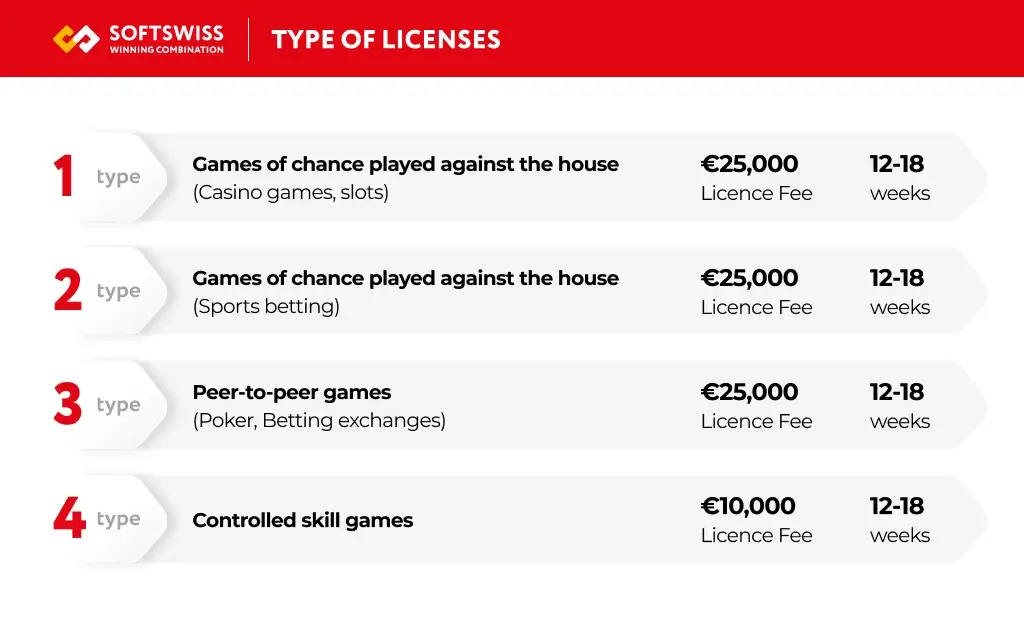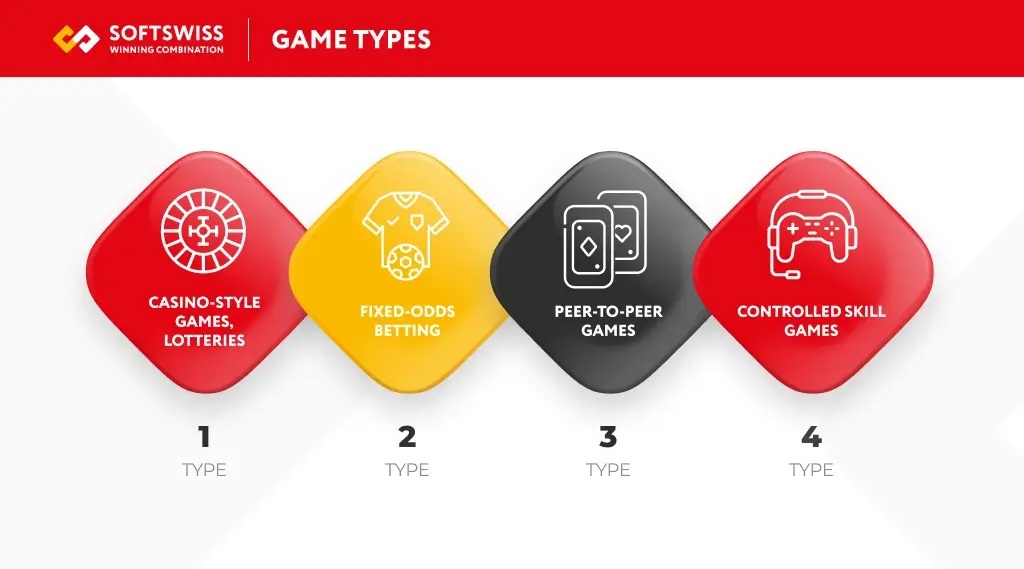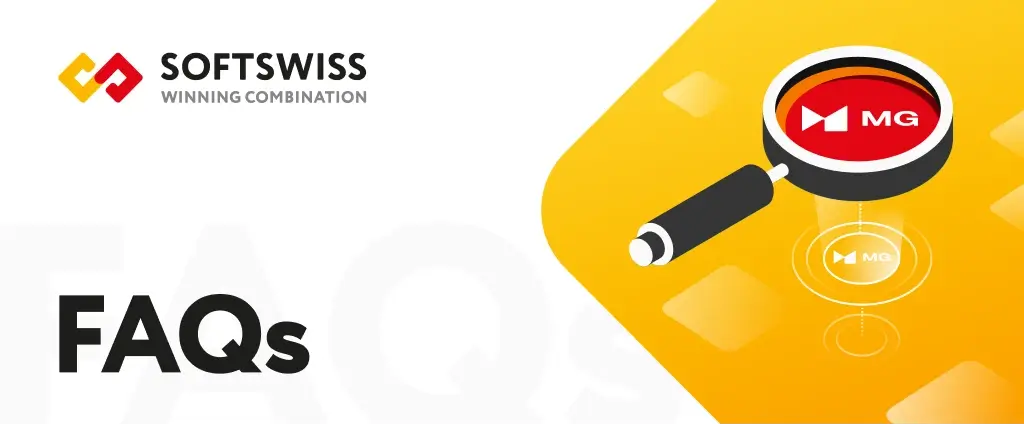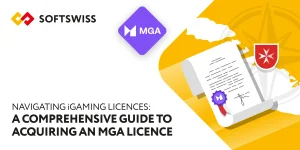Making the choice to obtain a Malta gaming license from the Malta Gaming Authority (MGA) symbolises a significant milestone in any iGaming journey. But this process is no easy feat – even for the most experienced of iGaming operators.
In this article, we’ll take you through the nitty-gritty of how to get a Malta gaming license, its benefits, the application process, and how SOFTSWISS can be the compass guiding you through this complex terrain.
TL;DR: MGA Essentials
Navigating the landscape of acquiring a Malta Gaming license can be complex at first glance.
Four main gaming license types are divided between Gaming Service licenses (for B2C) and Critical Gaming Supply licenses (for B2B). These licenses are available for both the ’Remote Gaming’ and ’Land-Based Gaming’ sectors.
Depending on your situation, here are the four license types to choose from:

To apply for an MGA gambling license, you first need to pay a one-time, non-refundable application fee of €5,000. The process itself then includes a ’fit and proper’ test, business planning, operational and statutory requirements review, and a thorough systems review.
Brief Overview and History
The Malta Gaming Authority (MGA) has a rich history as one of the first regulatory bodies of its kind within the iGaming space. It was this pioneering move that positioned Malta as an iGaming hub, prompting a significant influx of companies to its shores.
- 2001: The Malta Gaming Authority (MGA) – formerly the Lotteries and Gaming Authority – is founded as one of the first regulatory bodies in the industry.
- 2004: Malta joins the EU and becomes the first member state to enact comprehensive legislation for the remote gambling sector.
- 2017: The MGA announces plans to overhaul the legal and regulatory framework for gaming activities, moving away from license classes.
- 2018: Malta enacts the Gaming Act, 2018, streamlining and consolidating all existing gaming sectors under one legislative umbrella.
In the years since its inception, the MGA has continuously adapted its legislative framework to accommodate the rapidly evolving iGaming sector. With the introduction of the Gaming Act in 2018, Malta further enhanced its reputation as an authority in iGaming regulation.
Following the 2018 overhaul, the MGA extended the validity period for licenses from five to ten years. The MGA also moved to issuing just two major license categories: business-to-business (B2B) and business-to-consumer (B2C) licenses.
The B2B license, known as a ’Critical Gaming Supply’ license, enables companies to offer gaming services and software products to other businesses. In contrast, the B2C license, referred to as a ’Gaming Service’ license, is intended for operators directly providing gaming services to players.
These licenses cover four distinct game types, from casino-style games, lotteries (Type 1) to controlled skill games (Type 4). While the B2C license corresponds to specific game types (similar to the previous concept of Class 1, Class 2, Class 3 games, and skill games), the current framework eliminates the requirement for new licenses for each additional game class.
This grants licensed operators the flexibility to expand their game offerings without the need to repeat the licensing process for each new game type.
State of Malta Gaming Licensing in 2025
Since its inception, the MGA has been instrumental in shaping Malta into the globally recognised iGaming hub it is today. The MGA’s robust regulatory framework continues to attract operators seeking a reputable and cost-effective licensing solution.
The authority’s ongoing commitment to regulation and compliance is reflected in their intensive audit and review processes. In 2021 alone, the MGA carried out 54 on-site compliance audits and 230 desktop reviews, covering 65.5% of all licensees.
This dedication to industry compliance is balanced by a commitment to also streamline processes for licensees. Recent years have seen the MGA make significant strides in improving efficiency, reducing unnecessary bureaucracy, and making their processes leaner and more operator-friendly.
As of 2024, Malta is now home to over 300 online gambling companies, with the MGA also being responsible for over 10% of the world’s virtual casinos. This significant presence stems from the MGA’s proactive international strategy which included active involvement in global investigations into sports and gaming integrity, and a commitment to international regulatory collaboration.
Why Consider Becoming MGA-Certified?
An MGA iGaming license is an invaluable asset for any aspiring online casino operator. Obtaining this certification opens doors to numerous benefits that have the potential to elevate your iGaming business.
But what makes MGA certification so appealing?
-
Renowned Global Reputation
The MGA is widely recognised as one of the most reputable and reliable regulatory bodies in the iGaming industry. Acquiring and holding a Malta gaming license sends a strong signal of trustworthiness and integrity to potential players and business partners alike.
-
Access to Key Markets in Europe
A Malta online gambling license can provide your online casino with access to a number of significant markets, particularly in Europe. Many European countries recognise and accept the MGA license, allowing operators to tap into a broad customer base as part of this market.
-
Robust Regulatory Framework
The MGA provides a strong, transparent regulatory framework for operators. Their rules and regulations are comprehensive and clear, ensuring that you have a stable and predictable business environment.
-
Comprehensive Player Protection
The MGA is committed to player protection. Their rigorous standards ensure fair play and secure operations, which can enhance customer confidence in your brand and promote responsible gambling.
-
Ability to Leverage White Label Solutions
The advantageous framework offered by the MGA also extends to collaborations with licensed iGaming software providers. These providers usually offer a range of MGA-certified white label products designed to meet the rigorous standards set by the regulatory authority.
As a White Label operator, you gain the ability to launch your operation swiftly with all of the benefits of an MGA license – whilst also leveraging the software provider’s own industry expertise.
Types of Gameplay Covered
Online gambling licenses from the MGA encompass four game types, each catering to different gaming scenarios:

- Type 1: This license type includes online casino-style games, lotteries, and secondary lotteries. These games are typically based on chance (RNG-driven) and played against the house. Examples include online slots, roulette, blackjack, baccarat, and other table games.
- Type 2: This license type is for operators offering fixed-odds betting. In this type of betting, the outcome is determined by an event or competition separate from the game itself, such as sports betting and spread betting. The operator manages their own risk by setting the odds offered to the player.
- Type 3: This license type covers peer-to-peer games and betting exchanges. This would typically include online poker games (player vs player), player exchanges, and some types of lotteries.
- Type 4: This license type is for controlled skill games. These games are determined more by the skill of the player than by chance. Examples include fantasy sports and certain multiplayer online games.
It’s important to note, however, that these examples are very general guidelines, and the specific games falling under each license type can vary. For the most accurate information, it’s always best to refer to official MGA documentation.
Application Process
Obtaining an MGA license is a multi-step process aimed at ensuring only operators meeting the highest standards are granted a license. This process can be broken down into four main stages:
1. Fit and Proper Checks
At this stage, the MGA conducts a thorough background check of the applicant. This includes the financial stability and integrity of the operator, as well as the credibility and competence of the individuals involved.
2. Business and Technical Ability Review
The MGA evaluates the applicant’s business plan, the games offered, their technical setup, and the rules and terms of service. This is to ensure fairness, transparency, and adherence to MGA regulations.
3. System Review
The applicant’s live environment is tested by an independent auditor, who checks the gaming and control systems, including player registration and account controls, game logs, and payment integration.
4. Compliance Audit
After the license is issued, an MGA compliance audit will take place within the first year of operation to ensure ongoing compliance with MGA regulations.
Although this process might appear complex and time-consuming, the journey can be made significantly smoother with an industry expert like SOFTSWISS by your side. With over a decade of iGaming experience, we provide a range of innovative solutions designed to meet MGA’s stringent standards, such as the SOFTSWISS Casino Platform, the Game Aggregator, and the Jackpot Aggregator.
Fees and Taxes
A crucial aspect of obtaining an MGA license is understanding the associated fees and taxes involved in the process. The MGA has a fee structure in place that covers both application and annual fees, as well as gaming taxes that vary depending on the type of license held.
Application and Annual Fees
The MGA charges a one-time application fee for each type of license, as well as an annual license fee.
| License Type | Application Fee | Annual License Fee |
|---|---|---|
| Type 1 | €5,000 | €25,000 |
| Type 2 | €5,000 | €25,000 |
| Type 3 | €5,000 | €25,000 |
| Type 4 | €5,000 | €10,000 |
In addition to the application and annual fees, operators are also required to pay gaming taxes based on their license type.
Simply click on the arrows below to expand each table.
| License Type | Compliance Contribution for the Financial Year | Rate |
|---|---|---|
| Type 1 | For every euro of the first €3,000,000 | 1.25% |
| For every euro of the next €4,500,000 | 1.00% | |
| For every euro of the next €5,000,000 | 0.85% | |
| For every euro of the next €7,500,000 | 0.70% | |
| For every euro of the next €10,000,000 | 0.55% | |
| For every euro of the remainder | 0.40% | |
| Type 2 | For every euro of the first €3,000,000 | 4.00% |
| For every euro of the next €4,500,000 | 3.00% | |
| For every euro of the next €5,000,000 | 2.00% | |
| For every euro of the next €7,500,000 | 1.00% | |
| For every euro of the next €10,000,000 | 0.80% | |
| For every euro of the next €10,000,000 | 0.60% | |
| For every euro of the remainder | 0.40% | |
| Type 3 | For every euro of the first €2,000,000 | 4.00% |
| For every euro of the next €3,000,000 | 3.00% | |
| For every euro of the next €5,000,000 | 2.00% | |
| For every euro of the next €5,000,000 | 1.00% | |
| For every euro of the next €5,000,000 | 0.80% | |
| For every euro of the next €10,000,000 | 0.60% | |
| For every euro of the remainder | 0.40% | |
| Type 4 | For every euro of the first €2,000,000 | 0.50% |
| For every euro of the next €3,000,000 | 0.75% | |
| For every euro of the next €5,000,000 | 1.00% | |
| For every euro of the next €5,000,000 | 1.25% | |
| For every euro of the next €5,000,000 | 1.50% | |
| For every euro of the next €10,000,000 | 1.75% | |
| For every euro of the remainder | 2.00% |
| License Type | License Fees on Annual Revenue | Fee |
|---|---|---|
| Type 1 | Where annual revenue does not exceed €5,000,000 | €25,000 |
| Where annual revenue exceeds €5,000,000 but does not exceed €10,000,000 | €30,000 | |
| Where annual revenue exceeds €10,000,000 | €35,000 | |
| Type 2 | Annual revenue does not exceed €1,000,000 | €3,000 |
| Annual revenue in excess of €10,000,000 | €5,000 |
It’s also worth noting that the country’s unique tax structure includes a 5% Gaming Tax which is applied to the Gaming Revenue generated from players based in Malta. This is determined by whether the player is established, has a permanent address, and/or usually resides in Malta.
However, it’s important to consider other tax implications too when operating under an MGA license, as additional tax requirements may also apply for certain EU countries.
Partnering with SOFTSWISS gives the advantage of navigating this intricate tax and fee structure with ease and efficiency. Our expertise and industry knowledge can help streamline the process, ensuring that operators meet all necessary requirements while optimally benefiting from Malta’s favourable tax environment.
Why You Should Choose the Malta Gaming License
Navigating the iGaming landscape with the backing of a reputable regulatory body such as the Malta Gaming Authority (MGA) is a significant advantage. This strategic choice grants operators access to key markets, a robust regulatory environment, and a favourable tax structure. Yet, embarking on this journey requires resilience and meticulous attention to detail.

Frequently Asked Questions: Diving Deeper Into MGA Licensing
Is a server on Malta required for MGA licensing?
Yes, MGA licensing requires a server located in Malta.
What happens if a player self-excludes under one license? Can they play at another casino brand with the same license?
If a player is excluded due to potential gambling problems, they must be excluded from all brands operated by the licensee, whether the brands require separate registration or not. For brands that require separate registration, and if the exclusion is unrelated to gambling problems, the self-exclusion only applies to the specific brand where the request was made. If the brands allow one sign-up across sublicensed brands, self-exclusions must apply to all brands, regardless of the reason. Source: MGA’s Player Protection Directive.
What are the country restrictions for MGA-licensed operators?
Country restrictions for MGA-licensed operators depend on the jurisdictions they target. The MGA doesn’t provide a specific list of permitted jurisdictions, but it does require operators to comply with the laws of the countries they operate in. For B2C operators, this includes ensuring that their games are compliant and that their terms and conditions clearly state players’ responsibilities in checking the legality of their gaming activities. B2B operators, meanwhile, can only provide services to B2Cs licensed by authorities within the EU, EEA, or other well-regulated jurisdictions.
